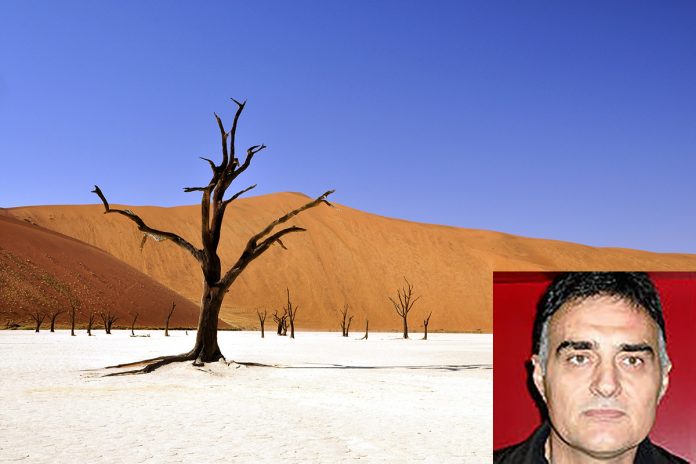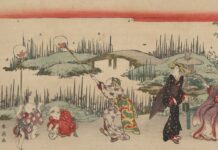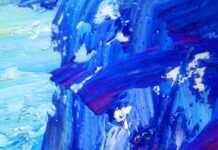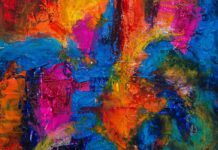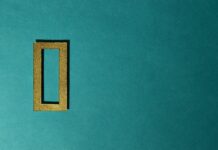Translated from Macedonian by Elizabeta Bakovska
Chona’s Chocho and Damjan Dabiziv are sitting under the withered plum tree on the boundary. The boundary divides them into two gardens, but the plum tree unites them under one shadow. There is no other tree around. Only under this shadow could one seek shelter, to protect one’s breath from the heat. The plum is like a relative to them, because Chona’s Chocho and Damjan Dabiziv have been living alone for a long time. The son of Chona’s Chocho, Chudo of Chona’s Chocho, died as an officer in the reserve in an undermined monastery, and the daughter of Damjan Dabiziv has been an emigrant for almost ten years, across the three seas and seven mountains. Chocho and Damjan come to the garden every day. Damjan Dabiziv comes first; he would sit under the plum tree, just like now, he would lean on it, and he would start to cry secretly, and then laugh publicly, waiting for Chona’s Chocho to come out of the corn.
The two gardens are exactly the same, long and narrow, like two ploughed lanes. There is room for only a few beds of peppers, some chilly, some sweet, only one bed of tomatoes, and at the ends, a few stalks of corn, two or three squash stalks and one or two basil stems. Only that much, and that is already too much because it often remains unpicked. Actually, they use the garden just to be close to one another. When they are seemingly doing something, when they are meddling in the gardens, they don’t talk at all, but as soon as they gather under the plum tree, separately, every man for himself, without being asked, they start praising the shadow and just like that, without noticing, word after word, again, God knows how many times, they engage in their strange conversation. By the way, not only are they not mentioning their names, but they aren’t even using the personal pronoun for second person singular. Actually, that is not a real conversation, because the one and the other, even though they are referring to the one or the other, are always addressing the third, which, of course, doesn’t exist at all. Here, just like now:
– No money or no mind, it is the same – says Damjan Dabiziv, moving his eyes across the edge of the shadow.
– A sinful man fears even his shadow – says Chona’s Chocho, taking a sip of water from the jug that lies near the plum tree root, covered in dust.
– The bridge is there to be stepped on – replies Damjan and sniffs two or three drops of rakia from the flask hanging on his neck like a cowbell.
The plum tree is trembling of heat, of weariness; the flies are blabbering, biting like mad, it will probably rain again. No one is coming to the gardens near Top Tashlari at such a shifty weather; just Chocho and Damjan, and one tiny, very tiny man who is peeping out from the corn above the waterway.
– It is good to know everything, but not to do everything – says Chocho.
– Praise me o mouth, or I will tear you apart – replies Damjan Dabiziv.
– A horse is bound to his harness, a man to his word!
– To each mountain, its own weight – replies Damjan. Only, a dead donkey does not fear the wolf – adds he and blinks, as if the rakia gurgling in his throat is striking some kind of a string attached to his eyes; he sucks the rakia and swaggers, growing of joy, it seems as if he is attempting to fly like a hatchling; he wants to but he can’t; he’s got desire but no strength.
– The tongue is where the toothache is – replies Chona’s Chocho and he is the one smiling now, actually, and as he is blabbering through his nose, he drags down Damjan Dabiziv along the trunk, he turns his legs in the direction of his garden; he leaves him confused, open mouthed and surprised.
– Give the fool a stick and he will break your head – says Damjan and jumps lightly, rising up by the trunk, lifting himself on his hands as if he would slide down a sheer slide.
– If every bee gathered honey, the bumblebee would gather the most – says Chocho and smiles, gurgles, dusts off his wriggled trousers with his hand, blue as a dried twig.
–The sun shines even on a cowpat – says Damjan Dabiziv, sweaty, clenching the flask with his toothless jaw.
– It is hard for a wise man with no fools around – replies Chona’s Chocho immediately, and the tiny man from the upper garden peeps like a mouse through the corn leaves.
– If that is the case – says Damjan Dabiziv, now completely furious, – if that is the case, – he repeats – then let him say, let him answer, what this is: I can enter your body, maybe make you choke and die?
– If so and so doesn’t know what he is asking, then he who knows will tell him – says Chocho, rolling his already whitewashed head across the plum trunk – It is smoke, duckling, – he continues – smoke as he who asks. And so and so surely knows what this is: it smokes, but does not burn, – says Chocho, tapping his head, actually enjoying his victory while tapping on the tree trunk.
Damjan Dabiziv, red as a clown, with red blotches, sticks his heels into the ground and digs, digs without hesitation, as if he would cut the boundary in half. He is trying to come up with an answer but he is out of time; Chocho is faster, he interrupts him:
– Does so and so know what this is: A red billy goat is lying in a cave – says he, seemingly calm, but actually boiling inside, overwhelmed with joy.
– It is a tongue, as the tongue of the one who asks, says finally Damjan Dabiziv. And his tongue is a billy goat and his mouth is a cave, may I piss on him from above – says he and sticks his heels even deeper in the ground, making two furrows down to the bottom of the boundary. And now – he goes on – let him listen – says he – to this and this, like that and that: a jug with seven holes, if you pour water it doesn’t flow. What is that, may he answer; – he asks and hops lightly up and down, giggling inside, thinking it couldn’t be seen, but the plum is shivering, trembling as if showered by rain.
Chona’s Chocho is silent; he scratches his head against the tree trunk, picking imaginary ants from his ears and nose.
– He doesn’t know, huh? – Damjan Dabiziv couldn’t restrain himself – because he doesn’t know, it will be revealed to him now. It is a head, you smart guy, it will be told to him, the poor guy, why not, it is a head just like yours, it would be told to him. It holds water, as they say, only if the mouth does not open, – he says and the plum tree clatters, shivers, it seems as if it would take off, it would go down in either one of the gardens. And from there, it knows best where to go and why.
– Seven holes in one lump – jumps Chona’s Chocho and immediately continues, so he wouldn’t be interrupted: – Because so and so, even if he wants to, doesn’t know, it will be told to him now, – he says – that is, you tortured soul, it will be told to him, that is your head, ruffian, your pumpkin, jerk, and it will be explained to him, that is your tambura, your ruffian, your stretcher (manger), your gourd, your dried twig, you airhead – says he and adds: – One should always carry an umbrella – says he, – always, you snout, it will be told to him, cause dew, my dear, dew might fall, and might dissolve you, you lump, and wash off your face, ruffian, and without a face you don’t exist, you can’t be recognized as a man, – ended Chona’s Chocho and moved in order to stand up.
– With or without one, with or without a face, the plum tree is his – says Damjan Dabiziv, – it’s his, – he adds, beating his chest with the hand.
Chona’s Chocho sits down again, weakens as if something had pulled him from behind.
– The plum tree is not his, it couldn’t be his – says he. If so and so doesn’t know, he should see where the branches are pointing!
– He will not look at the branches! What the hell is he going to do in the branches? He should see where the tree trunk is – says Damjan Dabiziv. And see where the root starts from, – says he and gets up, but the tree above him is short, dried and tiny, so he remains stooped, shriveled like a pooping puppy.
– Does he know where the middle of the boundary is, where the ridge is? – asks Chona’s Chocho and stands up.
And as he is standing up, his head disappears, lost in the leaves.
– His head is in my property now – says Damjan Dabiziv. It means that, if I want to, I can rip it out and not be held responsible.
– Let him try – says Chona’s Chocho. He who doesn’t start will never finish!
– The plum tree is not his – says Damjan Dabiziv, looking for Chocho’s head through the branches.
– Did so and so plant it? Did so and so shove it in the ground? Huh? – asks Chona’s Chocho from somewhere.
– That doesn’t matter! What matters is that it is on this side; not on that side of the boundary! And since it had decided, so be it! It is a time of democracy now, nature has the right to choose… – Damjan Dabiziv says, carried away, as his hand hits the ant that was seemingly climbing up the trunk.
The tiny man from the garden above stood up among the corns: his eyebrows are the same as the hair of the tops of the corn cob, and his ears are hanging like scalded leaves. He caught his ears with both hands, pulled them back and tied them on the nape, so they would not bother him. “It is not the first time that they are shouting in order to be right”, he murmured and kept on digging, shriveled under the corn cob.
– This is the truth and the only truth – Chona’s Chocho soothed himself. Some bird brought the seed. And it decided, it came to it naturally, it couldn’t help itself, couldn’t restrain anymore, and right here it dropped it. He might say that the bird could have flown a little bit in neutral, and that it could’ve, after all, dropped it in my or his garden. But he keeps forgetting that this is a democracy, the bird made its decision and that was that, it dropped it on the boundary, right here, right in the middle of so and so and me. Maybe it was diarrhea, who knows. Still, one way or the other, the seed fell here, in my part, an inch behind the line, on this side of the ridge, on my territory – ended Chona’s Chocho. It was either from the speech or the tree itself, but dozens of withered leaves fell from the plum tree. To conclude, the road is as good as the horse you ride – said Chocho. – To your health, sucker! – he added and became silent, peeping through the branches.
– The plum tree is on this side of the boundary! Even a blind man could see it – says Damjan Dabiziv. Only, father was right to say: bite the hand that feeds you, – he added, spitting out the leaves that he tore off with his mouth in anguish.
– What does so and so mean by that – asked Chona’s Chocho as his head was rustling somewhere up above, in the southern part of the crown.
A withered bough flicked Damjan Dabiziv on the face and shriveled him again as a puppy in the shadow:
– He knows well, – he moaned, shriveled under the plum tree.
– He doesn’t, – yelled Chona’s Chocho.
– The garden was taken from my father by force, and then split in half, divided into two gardens. One remained ours, and the other one was given to his father, – says Damjan.
– His father fought for that, – says Chona’s Chocho.
– For what, – asks Damjan Dabiziv. – for someone else’s garden to be given to him for free?
– They had to give something – says Chona’a Chocho. It’s not fair for some to always have everything and others to always have nothing.
– Some are always working, and others are always fighting not to work, for something to be given to them for free – he says. The plum tree is not his, and that’s that! – ended Damjan Dabiziv and jumped.
– The plum tree can’t be his, and that’s that! – shrieked Chona’s Chocho.
– The plum tree is mine alone – screamed Damjan Dabiziv, and stretching out his hands, he grabbed Chocho’s head, his ears more precisely.
– It will never be like it was before! – screamed Chocho and grabbed Damjan Dabiziv right by the ears. Suddenly, both of them started snorting, hitting the plum crotch, slipping down the trunk and wriggling along the boundary. The plum tree is shaking, the branches are shivering, the little leaves are crumbling; it would run away if it could, it would find a better place, a landscape with butterflies and bees and some water, so the leaves would not fall before their time, it would find that place, and it would live happily ever after. But…
– The apple never falls far from the tree – moans Chona’s Chocho, squeezing Damjan Dabiziv by the neck.
– You reap what you sow – moans Damjan Dabiziv, squeezing the neck of Chona’s Chocho.
– May his eyebrows perish – pants Chocho.
– May he never see the sun nor the moon – pants Damjan.
– May it please God a handful of dust be thrown at his eyes, the sooner the better – gurgles Chona’s Chocho.
– May his tongue rot, so he could speak and not understand what he has spoken – gurgles Damjan Dabiziv.
– Are you so and so? – collapses Chona’s Cocho.
– I am so and I am not so, – collapses Damjan Dabiziv.
Suddenly, the plum tree stopped shaking. The branches calmed down, the leaves stopped crumbling. Then, from the upper garden, the man with the tied ears came running, threw his hatchet down on the boundary and crossed himself. Chona’s Cocho was dead, and Damjan Dabiziv, with eyes wide open was still barely alive, showing signs of life.
– You were third cousins – murmured the tiny man, crossed himself and untied his ears, out of respect for the deceased. Only, third cousins – says he, – are not cousins without second cousins – he said. They either don’t know they are cousins or they don’t want to be cousins… – he added and he didn’t finish; Damjan Dabiziv died in his arms:
– Destiny – sighed the tiny man – only death will cure us from our diseases – said he and closed his eyes. He crossed himself for him too, spat in his hands, took the hatchet and, panting furiously, he cut down the plum tree on the boundary. The only shadow in the field fell along with it. Then, the tiny man tied his ears on the nape again, lifted the chopped plum tree on his shoulder, and together with the shadow, left across the deserted field, heading for Trebnik.
About the author:
Blaze Minevski (1961, Macedonia) is the author of the novels “Me, Lenin and Mickey Mouse”, “We Should Have Taken a Photo before We Started Hating Each Other”, ”A Story about a Third Party, “The Mark” and ”The Performers”. ”The Mark” won the award “Stale Popov” (2007) for the best book of prose, given by the Macedonian Writers’ Society, the award “Novel of the year” given by the newspaper ‟Utrinski Vesnik” and the award ”13th of November” given by the City of Skopje. He also has to his credit numerous short stories that have won wide acclaim.


